Economic Calendar for Cryptocurrency Traders for Week 51, 2024
2024-12-20
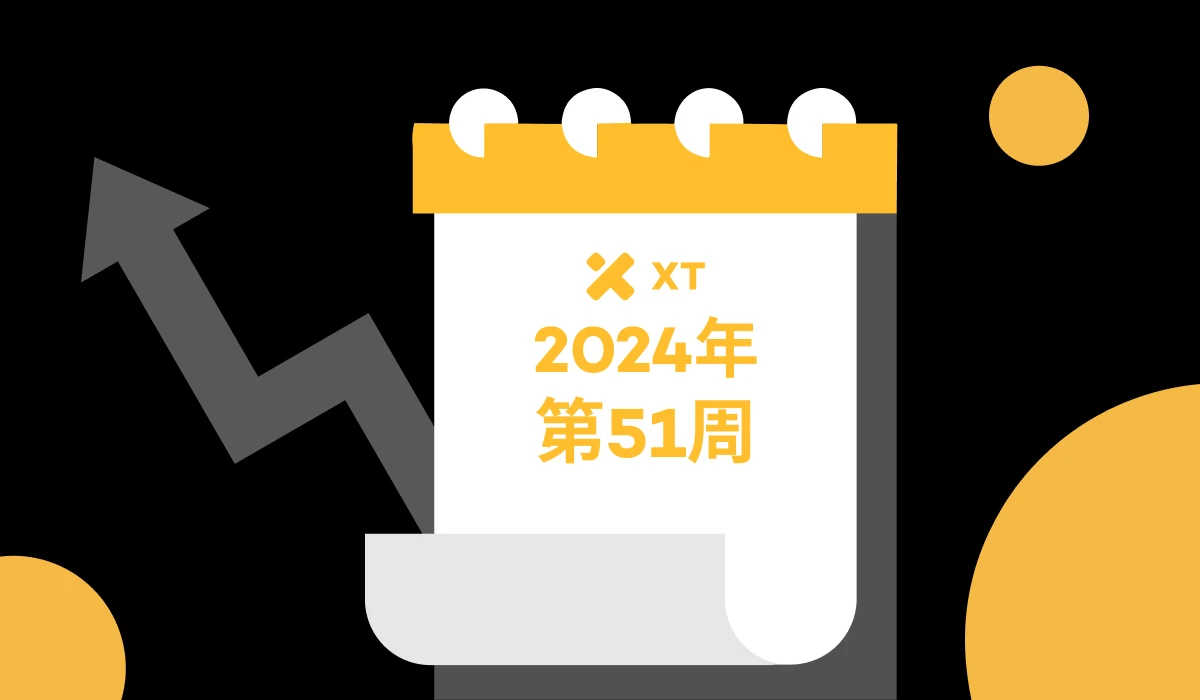
As we enter the penultimate week of December, Bitcoin is approaching its quarterly high for the year, while Ethereum’s Layer 2 ecosystem is expanding rapidly. Meanwhile, recent macroeconomic data has sparked both optimism and caution in the market, providing a complex backdrop for crypto investors.
This article will walk you through the key economic events of Week 51 and analyze the potential impact of each macro indicator on the crypto market. We will review the major data releases of the past week, focus on which cryptocurrency sectors performed well or poorly, and look ahead to market trends in the coming days. In the end, you will gain practical insights to help you deal with this weeks market volatility with a thoughtful strategy.

Table of contents
Economic calendar highlights for December 2024
What to expect this week
Cryptocurrency is the best performing sector this month
Next Weeks Outlook: Week 52 Expectations
Strategy and Risk
Economic calendar highlights for December 2024

Image source: Follow @XTexchange on X https://x.com/XTexchange
Key dates and potential impacts:

What to expect this week
Monday, Dec. 16 (China industrial output, retail sales): Correlations: China’s industrial activity and consumer spending could offer clues to the health of the global economy. A slowdown could dent risk appetite, while better-than-expected data could support a broader rally in risk assets, including cryptocurrencies.
Tuesday, December 17 (UK unemployment, German IFO business climate index, Canadian inflation, US retail sales): Correlations: UK job market and German business confidence surveys reflect the resilience or fragility of the European economy. Canadian inflation readings and US retail sales data will shed light on the North American economy. Positive data could boost investor confidence, thereby boosting demand for cryptocurrencies.
Wednesday, December 18 (UK inflation, US building permits): Correlation: UK inflation data could affect the Bank of Englands policy stance. Meanwhile, solid or improving US building permits, as a leading economic indicator, could support equities and risk sentiment, indirectly benefiting cryptocurrencies.
Thursday, December 19 (US Federal Reserve rate decision, Bank of Japan rate decision, Bank of England rate decision, US GDP growth quarter-on-quarter final value): Relevance: This is the most important day of the week. The Feds rate decision and its economic forecast will be key to market direction. Similarly, decisions by the Bank of Japan and the Bank of England, together with the final US third quarter GDP, will shape global liquidity conditions. Cryptocurrencies usually react strongly to hints of monetary easing or tightening.
Friday, December 20 (Japan Inflation, UK Retail Sales, US Core PCE Price Index, Personal Income Spending): Correlations: Japan’s inflation data and UK retail sales provide the final pulse check on the global macro economy before the weekend. US Core PCE Price Index (the Fed’s preferred inflation measure) and personal income and spending data could affect interest rate expectations and thus market sentiment, including the cryptocurrency market.
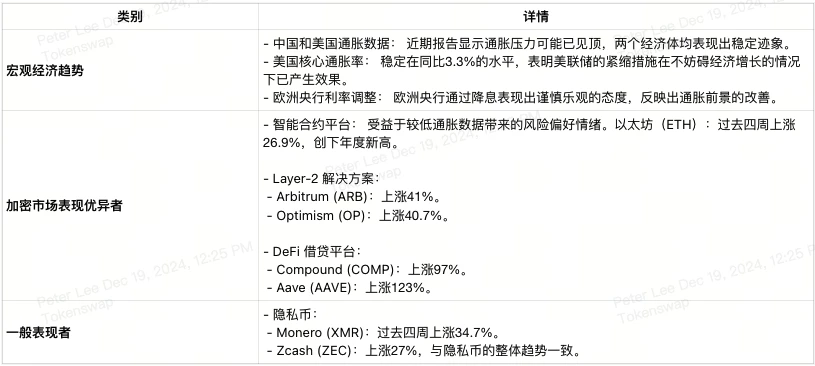
Macro Review: Last week, inflation data from China and the United States declined modestly, reinforcing the view that inflationary pressures may have peaked. The U.S. core inflation rate stabilized at 3.3% year-on-year, indicating that the Feds tightening policy has taken effect without hindering economic growth. Meanwhile, the European Central Bank showed cautious optimism by cutting interest rates, reflecting an improved inflation outlook.
Crypto Market Impact:
Outperformers: Smart contract platforms, Web3 infrastructure projects, and Ethereum Layer-2 solutions performed strongly last week, with DeFi lending platforms achieving triple-digit growth. Investors interpreted lower inflation data as a signal to increase risk asset allocation.
Average Performers: Privacy coins saw regulatory concerns emerge mid-week, dampening investor interest in some niche markets.
Analysis of economic data this week

In-depth analysis:
FOMC Decision (Thursday):
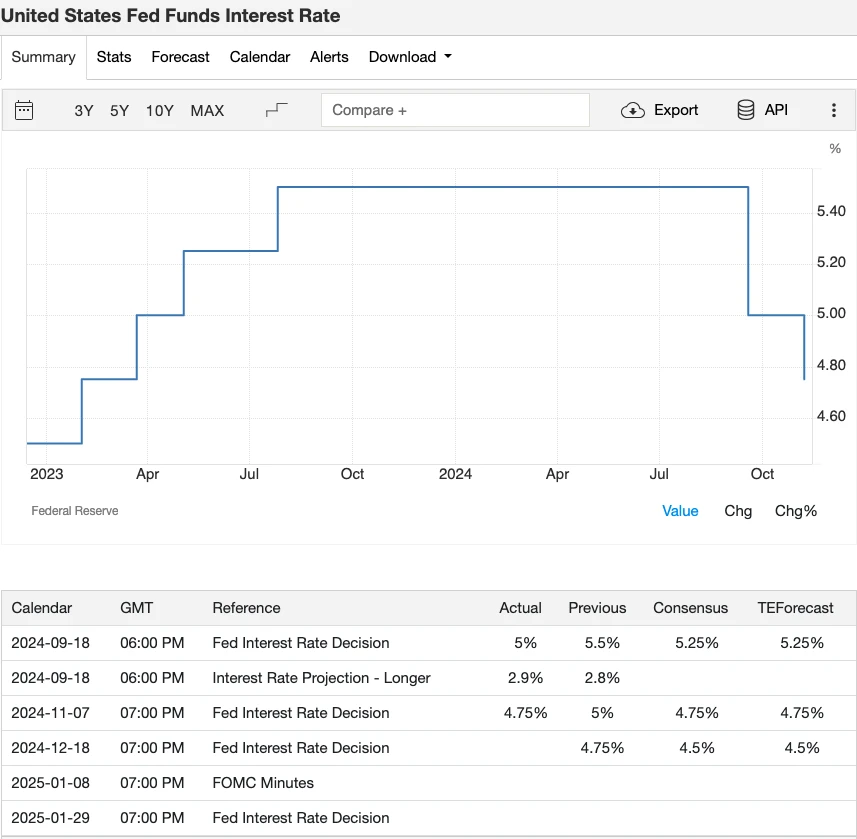
With inflation trending lower but still above the Fed’s target, markets will interpret the Fed’s rhetoric for signs of more modest rate cuts next year. A dovish bias could boost crypto markets again, while hawkish signals could cap gains.
UK and Bank of England decisions:
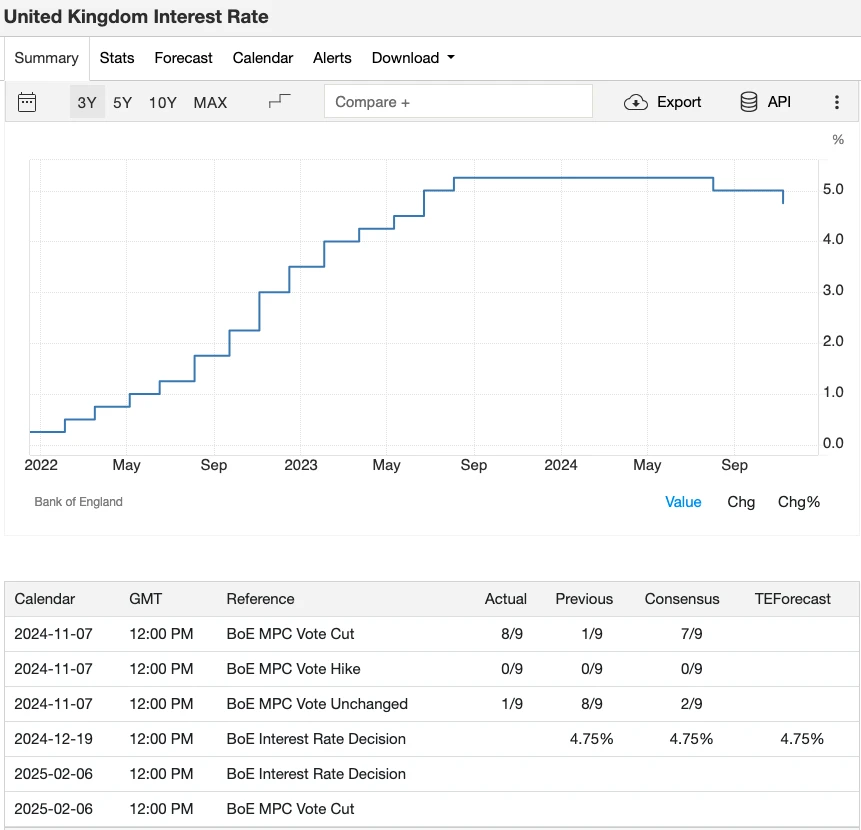
UK inflation data and the Bank of England’s subsequent interest rate decision will determine whether the easing path is confirmed or whether it will trigger volatility in the pound and UK-related crypto markets.
Bank of Japan Decision:
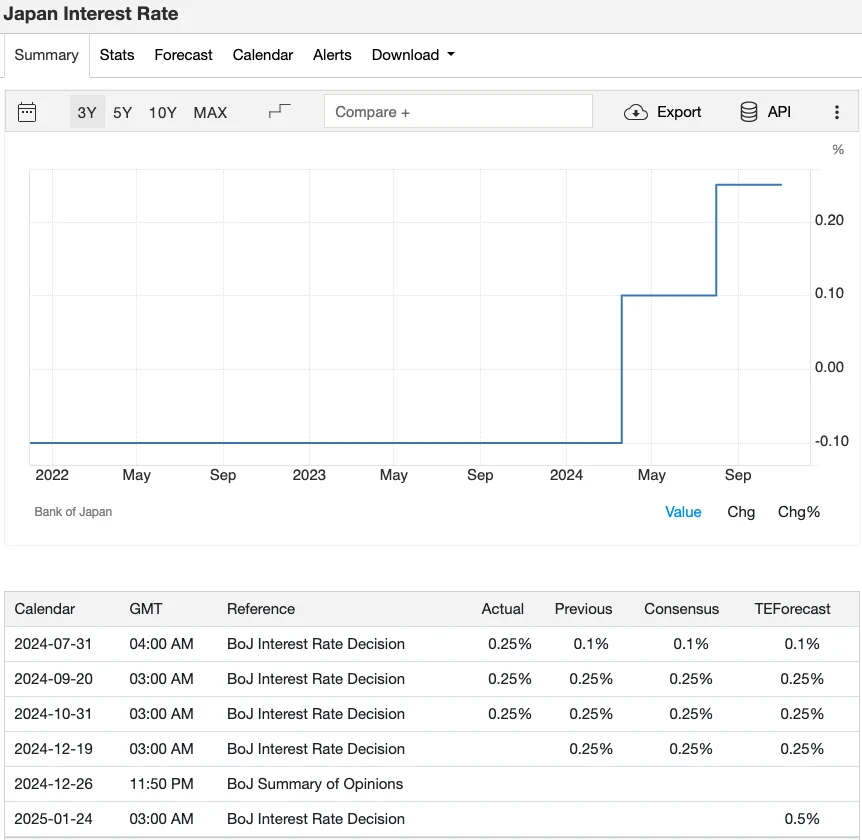
The Bank of Japan’s stance could affect the yen carry trade and global risk appetite. If the Bank of Japan maintains a dovish policy, riskier assets such as cryptocurrencies could benefit indirectly.
Sentiment: Early analyst comments suggest that major central banks are leaning slightly dovish. Institutional investors are showing higher confidence in holding digital assets, expecting monetary policy to become more predictable. While short-term derivatives markets remain cautious, medium-term options show growing confidence.
Top performing cryptocurrencies for the month
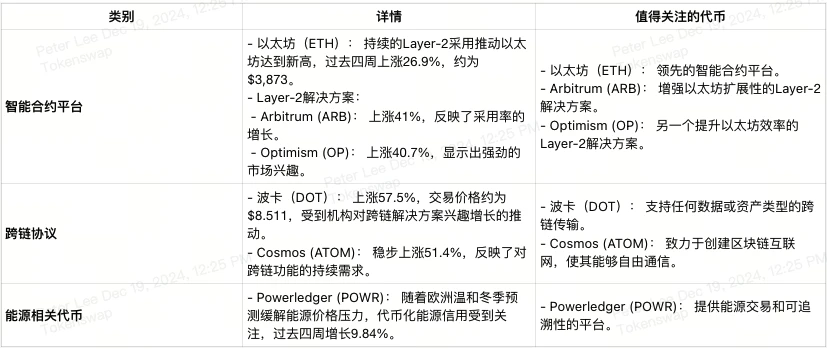
Performance Indicators:
Smart Contract Platform: Ethereum’s continued Layer-2 adoption drives price increases for itself and its Rollup tokens.
Cross-chain protocols: Cross-chain bridges and interoperability tokens are gaining momentum as institutional interest increases, reflecting the demand for a more interconnected blockchain ecosystem.
Macro Correlation:
Energy-related tokens: Projects related to energy efficiency or tokenized energy credits have gained some traction, which is related to the dynamics of traditional energy markets. With the forecast of a mild winter in Europe easing pressure on energy prices, such tokens have performed more prominently.
Noteworthy trends in the field

Emerging opportunities:
Tokenization of real-world assets (RWA): Institutional investors say that if central bank policies remain stable, tokenized bonds and real estate may attract more capital inflows and bring new vitality to the market.
DeFi Insurance Protocols: As macroeconomic volatility gradually subsides, some investors have begun to pay attention to DeFi insurance protocols as a safety net against platform risks.
The correlation between cryptocurrencies and macroeconomics:
As global interest rates stabilize, tokens related to commodities and raw materials are gradually gaining market attention. If energy markets fluctuate due to geopolitical tensions, such tokens may become the focus of attention.
Next Weeks Outlook: Week 52 Expectations
Preview: Economic activity next week is expected to be quiet due to the year-end holidays. However, traders will still keep a close eye on any unexpected announcements or policy signals. Eurozone inflation data and US consumer indicators are likely to set the tone for market movements in January.
Market Forecast:
If this week’s central bank decisions confirm that the interest rate environment remains stable, more funds may flow into the altcoin and NFT markets next week.
But if the central bank unexpectedly sends a hawkish signal, market enthusiasm could cool.
Strategy and Risk
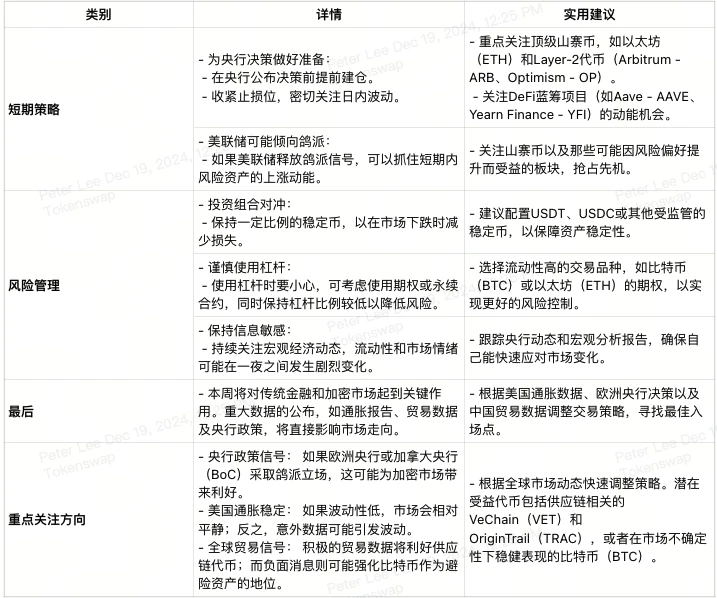
Short-term strategy:
If you are an active trader, you can gradually build positions before the central banks decision is announced on Thursday. Remember to tighten your stop loss and pay attention to intraday fluctuations.
If the Fed shows a dovish bias, short-term upside opportunities can be seized on top altcoins and DeFi blue-chip projects.
Risk Management:
Maintain a certain proportion of stablecoins as defensive assets to cope with sudden market declines.
Be cautious when using options or perpetual contracts and try to reduce leverage to account for the risks of major events such as central bank decisions.
Always monitor macroeconomic developments as market liquidity and sentiment may change at any time.
at last
The 50th week of the macroeconomic calendar is an important challenge for both traditional and crypto markets. Inflation data, central bank decisions, and trade data will be the core drivers of market sentiment and capital flows. From stable inflation in the United States to interest rate adjustments by the European Central Bank, to Chinas trade data and the UKs GDP, each piece of data may change the market landscape.
Key points of attention:
Central Bank Policy: Risky crypto assets could benefit if the ECB or Bank of Canada (BoC) send dovish signals.
US Inflation: If the data remains stable, the market will be relatively calm; but if there are unexpected changes, it may cause sharp market fluctuations.
Global trade data: Trade data from China and Germany can reflect the strength of demand. Positive data could drive supply chain tokens higher, while negative news could strengthen Bitcoin’s position as a safe-haven asset.
Planning ahead and paying attention to important data points are the keys to responding to market changes. Only by understanding market trends and adjusting strategies in a timely manner can you seize opportunities and avoid risks.
About XT.COM
Founded in 2018, XT.COM currently has more than 7.8 million registered users, more than 1 million monthly active users, and more than 40 million user traffic within the ecosystem. We are a comprehensive trading platform that supports 800+ high-quality currencies and 1,000 trading pairs. XT.COM cryptocurrency trading platform supports a variety of trading products such as spot trading , leveraged trading , and contract trading . XT.COM also has a safe and reliable NFT trading platform . We are committed to providing users with the safest, most efficient, and most professional digital asset investment services.










